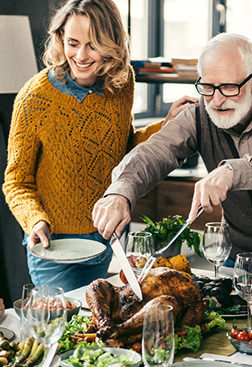The U.S. was the first country in the world to formally observe a day dedicated to giving thanks.
In 1789, George Washington proclaimed Thursday, November 26, as a “Day of Publick Thanksgivin” and in 1863, Abraham Lincoln fixed the last Thursday of November as the official day to commemorate a national day of Thanksgiving.
 But being thankful means so much more than pigging out on turkey and falling into a tryptophan coma one day each year. More than mini-marshmallows, more than parade floats, more than spending the day with amusing and/or terrifying relatives, and yes, even more than football.
But being thankful means so much more than pigging out on turkey and falling into a tryptophan coma one day each year. More than mini-marshmallows, more than parade floats, more than spending the day with amusing and/or terrifying relatives, and yes, even more than football.
Cultivating an attitude of thankfulness; one that lasts past the left-overs and carries you through the entire year can change your life. Seriously. Recent studies have demonstrated that expressing gratitude can have a profound and positive effect on your mood, your health, your relationships and can make you a better, well, everything.
Psychology professor Robert Emmons conducted a study in which participants were randomly given one of three tasks; weekly record five things they were grateful for, weekly record five things that were a hassle or weekly record five events that affected them in some way. After 10 weeks, the group that recorded what they were grateful for felt better about their lives in general; they reported fewer health issues and even exercised an average of 1.5 hours more than the other groups. Perhaps even more revealing, these positive changes were noticed by others; spouses of those in the gratitude group reported that they demonstrated a marked change in behavior and appeared to have a greater sense of well-being than previously. This is just one example in a multitude of similar studies which all have the same result; gratitude is good for you.
Other findings in related studies: gratitude brings us happiness; gratitude reduces anxiety and depression; gratitude bolsters our immune systems; gratitude helps us sleep better; gratitude makes us more resilient; gratitude promotes forgiveness; grateful people tend to “pay it forward”; gratitude is good for kids.
So what better time, in this season of gratitude, with this day devoted to giving thanks, to start making a concerted effort to be grateful? What are some things you can do to live a life of gr-attitude?
Borrow a page, literally, from Dr. Emmons’s gratitude study and keep a gratitude journal; make a daily or weekly recording of five things for which you are grateful.
Before you get up each morning, or while you are downing that first cup of coffee, “count your blessings.”
Replace a negative thought (“there is nowhere to park”) with a positive observation (“the extra walk will be good for me”).
Give someone a compliment every day, or invite them to share in your gratitude (“Did you see that incredible sunrise this morning?”).
 Take a vow of gratefulness; for ten days try not to complain. You will be astounded at how often you will catch yourself heading for that train of discontent.
Take a vow of gratefulness; for ten days try not to complain. You will be astounded at how often you will catch yourself heading for that train of discontent.
Volunteer; get involved in a cause that matters to you. When you begin to give back, you start to realize how much you have.
Take a picture of something you are grateful for every day; post it to Instagram or Facebook.
Download the headspace meditation app; set five timers to buzz randomly throughout your day; when you hear them, think of one thing you are grateful for in that moment.
The University of California, Berkeley, has launched The Greater Good Science Center focused on “The Science of a Meaningful Life.” One of their core values is gratitude and the implementation of “The Expanding Gratitude Project.” Visit their website http://greatergood.berkeley.edu/topic/gratitude for videos, articles, studies, recommended reading and links to related websites.